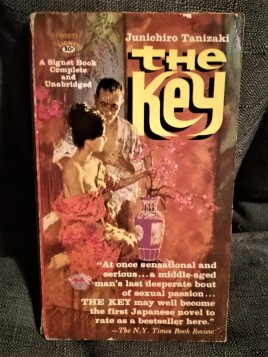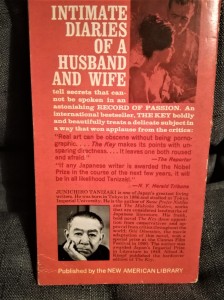So far for the Japanese Literature Challenge I’ve explored an essay on aesthetics and a powerful memoir of nuclear attack; and I said at the end of my post on the latter than I imagined my next Japanese book this month would be a little lighter. Well, it certainly was a slim volume of fiction; however, the subject matter was complex and left me thinking a lot about the relationships between men and women. In my first Japanese post on Jun’ichirō Tanizaki I mentioned that I would have to look on the TBR and see if I had anything else by him; I do, and that’s the book I want to talk about today – “The Key”, published in a translation by Howard Hibbett in 1960. And as you can see from the rather lurid covers of my US Signet Books edition, sexual passion is at the heart of the book…
“The Key” is one of Tanizaki’s later books, and it takes the form of diary entries; these are drawn from the journals kept separately by a husband and wife, a 55 year old Professor, and his 44 year old wife Ikuko. They live with their grown up daughter Toshiko, and the Professor has singled out one of his young teachers, Kimura as a possible husband for Toshiko. However, all is not well with the marriage. The Professor claims to adore his wife but feels that he cannot satisfy her sexually, and is concerned that she is too refined to let him indulge his passion for her, even to see her fully naked.
Ikuko, however, is conflicted; one minute she claims to love her husband, the next to hate him and find him repulsive. It may be the age difference; it may be that she has retained her looks despite having a child, whereas he is an unhealthy, unattractive specimen; or it may be that she is attracted by the virility and youth of Kimura. The reader watches what happens, and the possible development of a menage-a-trois or even a-quatre – all the while realising that what they are reading is filtered through the sensibilities of both parties in the marriage, presenting in their diaries what they want their partner to be secretly reading (all the while denying that they are reading the other’s journal).
And now I hit the dilemma of how much more to discuss the plot; because I came to this book with no knowledge of the story or preconceptions, and I think that’s the best way to read it! Tanizaki very cleverly lets his tale develop from the two separate viewpoints of the married couple and the reader is left to read between the lines and work out what’s *really* going on; much is confirmed at the climax of the book (ahem…) but plenty is left unresolved… There are plot elements I can’t mention specifically, but which are to do with the Professor’s treatment of his wife; however, her diaries reveal that she is more in control of what is happening, and actually stimulated by it, than her husband might think!
As I mentioned above, my mid-20th century addition has a cover which is covered with sensationalist blurb; so you may be wondering whether the book is as torrid as is made out. Frankly, I would say it’s very mild compared with modern media of all kinds but probably *was* quite shocking at the time. There is nothing graphic or particularly gratuitous but the frank discussion of sexual needs (particularly that of a woman) was possibly groundbreaking. The behaviour of the couple towards each other, although again nothing really graphic occurs, is fairly shocking and at the time would have disturbed Western sensibilities – I imagine the traditional American could have been a bit outraged!
Why should he have dropped the key in a place like that? Has he changed his mind and decided he wants me to read it? Perhaps he realises I’d refuse if he asked me to, so he’s telling me: ‘You can read it in private – here’s the key.’ Does that mean he thinks I haven’t found it? No, isn’t he saying rather: From now on I acknowledge that you’re reading it, but I’ll keep on pretending you’re not?’
Well, never mind. Whatever he thinks, I shall never read it.
Putting all that aside, how does the book read to this modern reader? Very well, actually; I can imagine that readers much younger than me would be rather cross about some elements, but I think that’s perhaps a fairly shallow response. Without wanting to give anything much away, both parties to the marriage are guilty – of lack of communication, of not respecting each other’s wishes or needs or feelings, and of manipulating the other. So there are not necessarily any victims – or if there is, it’s not the victim you might expect! As for the key of the title, well that refers to the one the Professor uses to lock his diary in his desk drawer then leaves lying around for his wife to find and open the drawer… Twists abound from the very first page of this novella! 😉
I’m sorry if this is all a bit vague in places but I’m trying desperately not to give anything away. Suffice to say that Tanizaki brilliantly portrays a pair of unreliable narrators, gradually teasing out the story to its dramatic fulfilment and “The Key” is a very clever, very readable and actually very thought-provoking book. If nothing else, it certainly convinces the reader that a good relationship is based on communication










